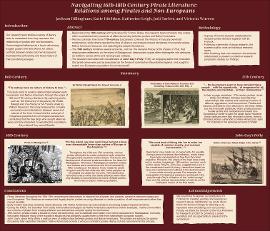| dc.contributor.advisor | Frohock, Richard | |
| dc.contributor.author | Dillingham, Jackson | |
| dc.contributor.author | Ditchkus, Katie | |
| dc.contributor.author | Leigh, Katherine | |
| dc.contributor.author | Tarbet, Jodi | |
| dc.contributor.author | Warren, Victoria | |
| dc.date.accessioned | 2023-04-11T14:30:00Z | |
| dc.date.available | 2023-04-11T14:30:00Z | |
| dc.date.issued | 2023-04-18 | |
| dc.identifier | oksd_URS_2023_ditchkus | |
| dc.identifier.citation | Dillingham, J., Ditchkus, K., Leigh, K., Tarbet, J., Warren, V., & Frohock, R. (2023, April 18). Navigating 16th-18th century pirate literature; Relations between early pirates and non-Europeans. Poster session presented at the Oklahoma State University Undergraduate Research Symposium, Stillwater, OK. | |
| dc.identifier.uri | https://hdl.handle.net/11244/337345 | |
| dc.description.abstract | From the early sea dogs to the golden age of piracy, this panel studies a series of literary texts to understand how they represent the relationship of pirates with non-Europeans. Some imagined alliances as a key to advancing English goals in the New World; for others, conflicts between pirates and non-Europeans illustrated the self-serving and brutal nature of their plundering voyages. Beginning in the 16th century with texts about Sir Francis Drake, this panel considers how writers often romanticized first accounts of pirates and native groups forming alliances. We next consider how some 17th-century buccaneers continued the rhetoric of mutually beneficial relationships, while others rejected the idea of alliance and instead showed plunderers inhumanely seizing Native American resources and exploiting the people themselves. The 18th century furnishes several accounts, such as the General History of the Pyrates (1724), that depict pirate settlements on the island of Madagascar; these pirate utopias often disintegrate into dystopias as relations across ethnic and racial groups collapse. The panel concludes with consideration of John Gay’s Polly (1729) an engaging and satire that concludes that pirate crews were just as prejudiced as the forces of colonization they rebelled against, and sought to exploit non-European populations for private benefit. | |
| dc.format | application/pdf | |
| dc.language | en_US | |
| dc.publisher | Oklahoma State University | |
| dc.rights | In the Oklahoma State University Library's institutional repository this paper is made available through the open access principles and the terms of agreement/consent between the author(s) and the publisher. The permission policy on the use, reproduction or distribution of the article falls under fair use for educational, scholarship, and research purposes. Contact Digital Resources and Discovery Services at lib-dls@okstate.edu or 405-744-9161 for further information. | |
| dc.title | Navigating 16th-18th century pirate literature; Relations between early pirates and non-Europeans | |
| osu.filename | oksd_URS_2023_ditchkus.pdf | |
| dc.description.department | English | |
| dc.type.genre | Poster | |
| dc.type.material | Text | |
| dc.type.material | Image | |
